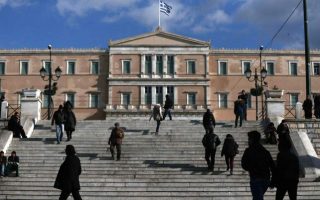The judicial ordeal of ELSTAT’s Andreas Georgiou continues

Contrary to what many believe, the ordeal of Andreas Georgiou, the former president of the Hellenic Statistical Authority (ELSTAT), in the Greek courts has not ended. After being tried three times for allegedly inflating the 2009 deficit, which New Democracy circles believed pushed the country deeper into austerity, the Appeals Council acquitted him for the third (!) time in 2019.
However, in a separate but related case, in 2017 he was given a two-year suspended prison sentence for breach of duty because he did not seek the approval of the ELSTAT board before communicating the revised fiscal figures for the period 2006-9 to Eurostat in November 2010.
His conviction contravenes the Code of Practice for European Statistics (COP, Principle 1.4), which explicitly states that the head of the statistical service has “sole responsibility” for the compilation and publication of statistics, which are obviously not subject to voting. This European rule safeguards the reliability of EU statistics and protects them from political interference – obvious in the case of the “Greek statistics,” which became synonymous with unreliability in the period before the crisis.
After a 12-year ordeal in the Greek courts, Georgiou appealed to the European Court of Human Rights (ECHR). The ECHR acquitted him unanimously in March 2023 and fined Greece for violating his right to a fair trial. This conviction exposes the Greek judiciary, because it chose to ignore exculpatory evidence (such as statements of European officials) and tacitly refused to submit a pre-trial question to the (administrative) Court of the European Union on the correct interpretation of the COP, which it misinterpreted. In essence, the judiciary got involved in political games: The Appeals Council repeatedly rejected exculpatory submissions by prosecutors and investigators in the case, and sent him to an open trial in 2016. His acquittal at open trial in the First Instance Court was subsequently overturned so that he could be retried – an extremely rare occurrence – for the same offense by the Court of Appeals, which convicted him in 2017, and finally the Supreme Court in 2018 upheld this conviction in violation of his human rights.
At the same time, in the related case of the alleged inflation of the deficit, the Supreme Court’s prosecutor overturned earlier acquittals by lower courts in 2015-7, pursuing repeated prosecutions with the aim of obtaining a conviction that would prove beyond all doubt that the memoranda and associated conditionality were imposed not because of misguided political choices that bankrupted the country, but because there was hidden collusion with the lenders to impose austerity on Greece. The former president of ELSTAT was the scapegoat for politicians who wanted to avoid responsibility for the country’s bankruptcy, but at the same time he united center-right New Democracy and radical-left SYRIZA in a common narrative based on the false belief that the memoranda with the creditors caused the crisis, and not the other way around. In a pre-election speech in December 2014, SYRIZA leader Alexis Tsipras, who promised to abolish the memoranda “with one law and one article,” wondered, “Why did ELSTAT really inflate the public deficit, pushing the country into the eye of the storm?”
The former president of ELSTAT was the scapegoat for politicians who wanted to avoid responsibility for the country’s bankruptcy
The last act of the drama will be played out on May 17, when the Supreme Court will meet to consider Georgiou’s request for a retrial for breach of duty as a result of the ECHR’s decision. The decision will shed light on whether Greek justice is really independent or it continues to get involved in political games. The verdict is still pending. Let’s hope that the Supreme Court will close the matter here, instead of causing new delays and uncertainty by resending to the Court of Appeal a case that is already past the statute of limitations. The decision of Prime Minister Kyriakos Mitsotakis’ government in July 2023 to withdraw the appeal against the decision of the ECHR points to a change of climate after Georgiou’s acquittal. The appeal was filed by the Legal Council of the State on June 8, when the caretaker government was in office but had not given such an order, raising suspicions that the order had been given by the previous leadership of the Ministry of Finance to which Council reports.
The change of climate is also apparent in the recent resignation of former ELSTAT executive Nikolaos Stromblos from the continuation of his lawsuit against Georgiou for alleged slander. Stromblos – a key prosecution witness in the case of the alleged inflation of the 2009 deficit – had taken legal action against Georgiou in response to a press release he issued as president of ELSTAT in 2014, in which he raised the reasonable question why he was being prosecuted for data that Eurostat fully accepted, while the Greek courts never investigated the faulty “Greek statistics” submitted previously. Georgiou was found guilty and faced confiscation of his property if he did not pay a large monetary compensation for defamation. In January 2023, the Supreme Court ruled that his sentence would be suspended until the hearing of his appeal, following which Stromblos finally resigned.
The Georgiou case has done enormous damage to Greece’s credibility as a country with an independent judiciary that observes the rule of law. International support for Georgiou remains strong, with numerous articles published in the international press and letters addressed to the Greek government from high-ranking officials of international organizations and scientific societies. In recent years, the US State Department’s annual report on human rights around the world presents Greece as a country that violates them, specifically mentioning the Georgiou case. The EU and other organizations have repeatedly called on successive Greek governments to publicly support Georgiou for over a decade.
But they all hid behind the excuse that they do not comment on ongoing court cases, citing the separation of powers. But the separation of powers does not negate the freedom and obligation of governments to publicly express their opinion, recognizing that Georgiou restored the credibility of Greek statistics, which are fully accepted by European institutions and are still used today. The Greek state owes a big apology to Georgiou for all the years he has been suffering in the Greek courts for doing his duty.
Dr Miranda Xafa is a former member of the Executive Board of the International Monetary Fund.





